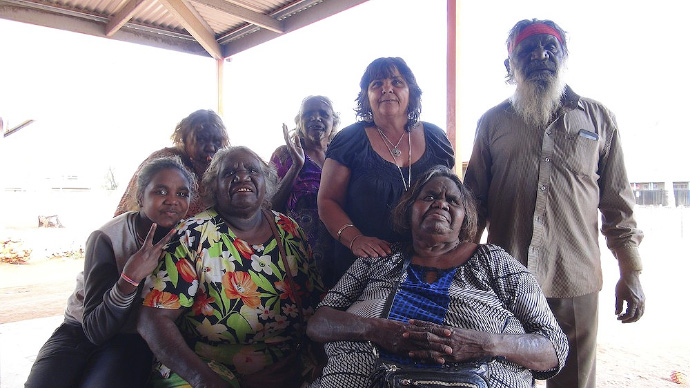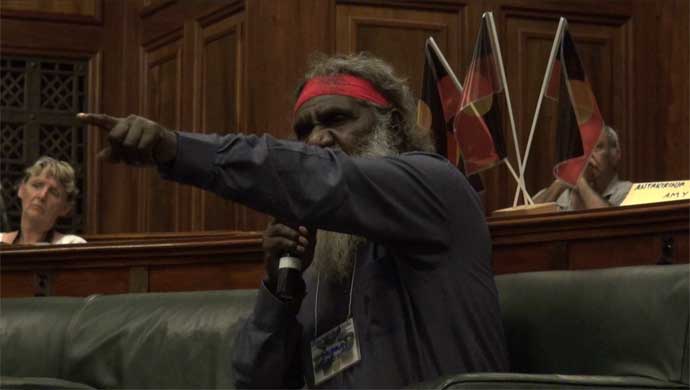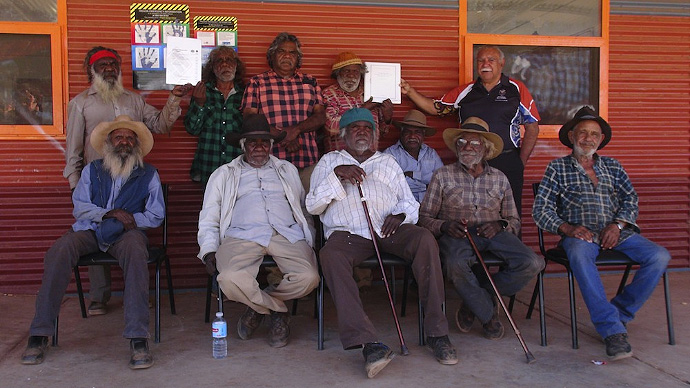"Queen got no right here. This is our Country, under our Tjukurpa Law ..." - Murray George
Ghillar Michael Anderson 1 October 2015
Tjilpi (senior Lawmen), Wati (Lawmen) and Pompa (Law Women) have now come to understand how the authority of the Tjukurpa Law is what gives the sovereign Peoples, the Anangu, dominion, in the absolute sense, over their Lands and Territories. Whiteman law is an imposed law and they no longer accept that the whiteman law is to prevail on or within their Country.
They have now decided to develop their own strategies for their Tjukurpa Law to be the effective Law in their County, as it was before the whiteman came. If the white people want their law to have any effect then, from now on, that will have to be subject to negotiation with the decision-makers in the Pitjantjatjara Yankunytjatjara Law and Culture Pty Ltd company, which they have recently established independently of the Anangu Pitjantjatjara Yankunytjatjara Land Rights Act 1981 as amended.
Having workshopped the APY Land Rights Act in the bush for the last two days senior leaders of the Anangu Pitjantjatjara Yankunytjatjara now can see clearly how the colonial whiteman law creates an autocratic rule and, in some cases, dictates how Law business is to be done on their Country, under the rules, as have been defined by the Queen’s Parliament in South Australia. The most telling of all statements that were made over the two days was when Tjilpi Murray George, the Chair of Pitjantjatjara Yankunytjatjara Law and Culture Pty Ltd said: “Queen got no right here. This is our Country, under our Tjukurpa Law and Culture.”

Enlarge Image
Murray George: Far right
Participants at the meeting very clearly understood what the High Court judgment in Mabo said when the judges ruled the Aboriginal Law, Culture and customs come from Aboriginal people and it is not a construct of the English law. Tjukurpa Law was here for thousands of years before the colonists came, but it is now recognized by the common law of Australia. This is unique (sui generis) and it is the first time that this recognition has been given to Aboriginal Law and Culture. It is this legal recognition that now reassures the Tjilpi, Wati and Pompa of Anangu Pitjantjatjara Yankunytjatjara Lands and Territories that there is no need for Native Title, not only because they already have freehold title to APY Lands, but also because they already have the Law, they live by it in their own Country according to the Tjukurpa. They know the Law, the Dances, Songs, Stories, Storyplaces and how the Songlines connect across their Country and beyond.
It is from this understanding through their Law and Culture that the Tjilpi, Wati and Pompas are working towards effecting their sovereign claim of right to be independent and self-determining in the modern world. They have been independent over millennia, from the Beginning. But now there is a problem with the wording ‘self-determination’ because, from the point of view for many Anangu, ‘self-determination’ is interpreted to mean that individuals can become a law unto themselves and claim individual ownership at the exclusion of others. This concept is often encouraged by Native Title anthropologists and lawyers, whereas the Anangu Lawmen and Law women’s point of view is that we have collective rights as a community and Peoples and that our way is that the one person who is the speaker for the Tjukurpa for that Country is actually representing everyone who belongs to that Storyplace and Story. Under our Law we always have one senior person who speaks for that Law and who takes responsibility for that Storyplace and its Stories, because that is the person who is entrusted with the knowledge, on behalf of others with connection to the Storyplace.
Another significant issue that was voiced is for people to understand is that the Tjukurpa (Dreaming) in one place has a songline to another and this is replicated across the continent. We may speak many languages, but we have One Law. They also proposed that there can only be one way to unite our people and that is under our Aboriginal Law, not under whiteman law, as whiteman law is about division – not unity.
At the conclusion of the meeting it was decided the ambition for independence (and self-determination)needs to be nutted out sufficiently clearly for everyone to understand that it is inclusive of all and it is not a single right of ownership per se. The meeting also proposed a delegation represents them at government level to discuss their right for Tjukurpa Law to govern APY Lands and Territories.
The meeting also resolved to ensure a strong and representative delegation travels to Canberra to attend our Sovereign Union’s Gathering of Nations at Old Parliament House on 21 & 22 November 2015. One of the key issues that must be discussed is how to let the world know that Aboriginal law is the Law of the Land, and not the Queen’s law.
Convener of Sovereign Union of First Nations and Peoples in Australia and Head of State of the Euahlayi Peoples Republic Contact Details

Lawman Murray George at Sovereign Union Gathering in Canberra 2013
Aboriginal Law must sit on top of whiteman's law, because 'our Law is the Law of this land'



